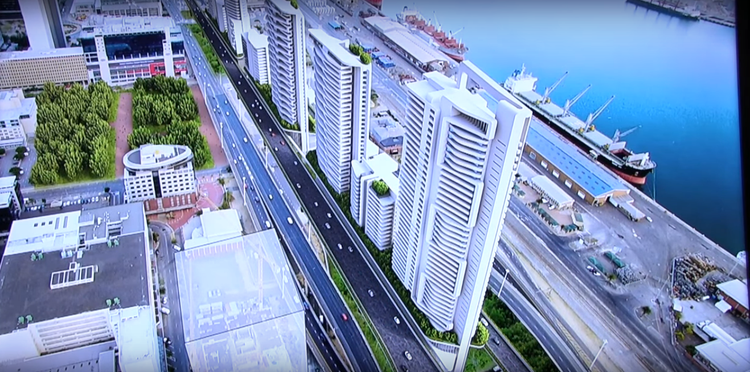

Graphical depiction of the winning bid’s vision of the foreshore. Captured from Youtube video
26 February 2018
Political meddling and cover-ups by senior City officials have soured plans for the massive development of Cape Town’s Foreshore, according to documents presented to the City Council.
The qualifying bid for the development of prime land on the Foreshore and the unfinished freeway, announced last week, involves 11 tower blocks and ten other buildings. Political meddling in the bid evaluation process was one of the issues that led to the motion of no confidence in Mayor Patricia de Lille earlier this month. De Lille survived the motion by one vote.
The City in 2016 invited proposals for the development of the six-hectare strip of City land next to Nelson Mandela Boulevard, as well as other City-owned sites on the Foreshore, including Gallow’s Hill.
Six bids were accepted and the presentations were shown to the public at the civic centre in March 2017, with residents invited to vote for their favourite bid.
The qualifying bid was to have been announced in July last year, but this was delayed after the Bid Evaluation Committee (BEC) was disbanded by then City Manager Achmat Ebrahim, and a new committee was constituted.
Ebrahim stated he had “developed some discomfort” with the BEC composition and process.
During a council meeting in November, following this announcement, Transport and Urban Development Authority commissioner Melissa Whitehead, whose department is managing the process and who was one of the committee members, stated there had been a “deadlock” within the bid committee over “scoring methodology”.
But Craig Kesson, Executive Director in the Directorate of the Mayor, states in an affidavit tabled before a special council meeting on 21 November that independent consulting company Moore Stephens had criticised Whitehead’s behaviour in the committee. It said she wished to reject one bid because it was not politically acceptable, and pushed committee members to favour another.
The former director of Urban Catalytic Investment, Frank Cumming, who was hired in April and also served on the original committee, was controversially dismissed at the end of his six-month probation period in October, after objecting to Whitehead’s pressure on the committee to favour a particular bid.
Cumming accused her of “misconduct and impropriety” and took his concerns to Ebrahim, but the City Manager decided not to investigate.
As a result, Cumming referred the matter to the Public Protector.
Among Cumming’s accusations, contained in Kesson’s affidavit, was that “the Commissioner regularly expressed concern regarding the ‘political acceptability’ of the location of the affordable housing proposed by the other front-runner (and by implication, competitor to her preferred scheme) throughout the evaluation process”.
He said Whitehead was “particularly forceful in this regard”.
Cumming said he was worried about funding for the scheme Whitehead favoured, but his comments were largely ignored. He has approached the Commission for Conciliation, Mediation and Arbitration about his dismissal. The hearing is ongoing.
Whitehead has since been suspended pending an investigation.
De Lille has stated that Kesson’s allegations — which were made under oath — are “false” and constitute a personal attack against her and others.
According to the chair of the current bid evaluation committee, Paul Vink, the names of the initial committee members may not be disclosed as “the initial bid evaluation process is the subject of an ongoing confidential internal investigation”.
The members of the new committee may also not be disclosed, as the supply chain management (SCM) process has not yet been concluded.
“Stage 2 is still to follow, and only the [Bid Evaluation Committee] can award the tender. Thus, all of the standard requirements for confidentiality throughout a SCM process still apply, and the names of the reconstituted BEC members can thus not be disclosed,” said Vink.
He also declined to release the results of the public vote on the bids.
Jean-Luc Limacher, director at Urban Dynamics, one of the six bidders, said he was curious to know how the public had voted. He said he was surprised the City had not released the results of the vote which should be available to the public.
Limacher said the only information Urban Dynamics had received from the City was that its bid did not meet the minimum requirements. He said the firm had requested further information and would decide whether or not to appeal.
Unsuccessful bidders were given 14 days to lodge an appeal after the announcement of the qualifying bidder on Monday 12 February.
The qualifying bidder is Mitchell Du Plessis and Associates (MDA). The company’s plan is to finish the freeway, elevate it above the height of Nelson Mandela Boulevard, and construct 11 tower blocks between the inbound and outbound sections of Nelson Mandela Boulevard, ranging from 63 to 143 metres in height. These would house residential units at market-related prices.
A further 10 residential buildings on the northern edge closest to the harbour would be built to house affordable residential units.
In all, 3,650 residential units are proposed, 450 of them for affordable housing. Most of these appear to be situated below the elevated freeways.
The proposal has been slammed by urban development planning experts.
In an upcoming article, we’ll describe Whitehead’s view of what happened.